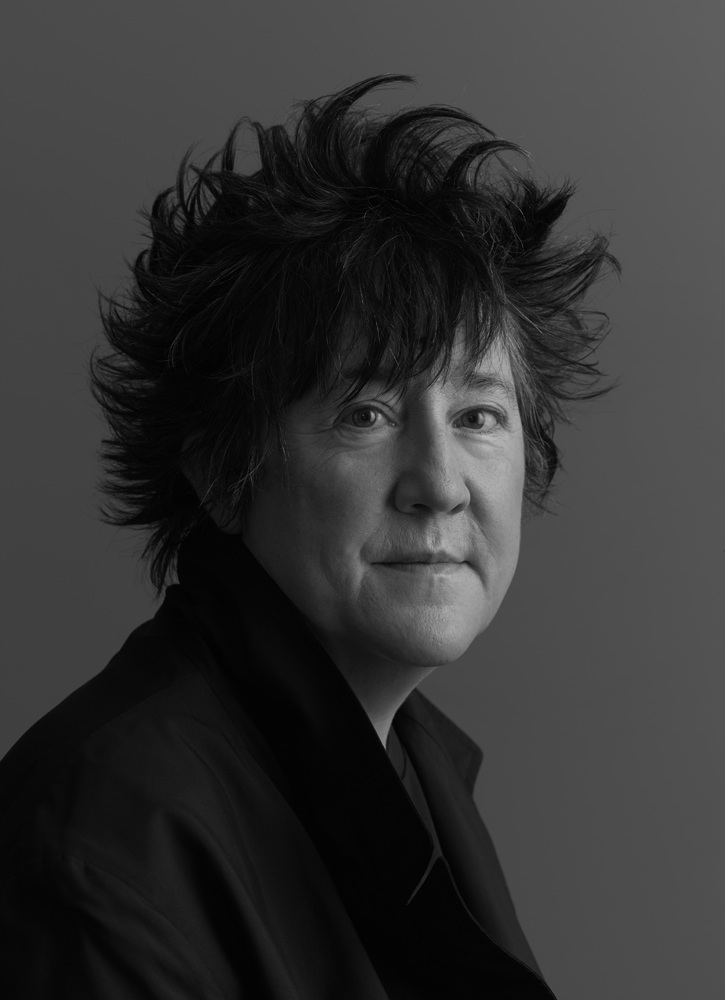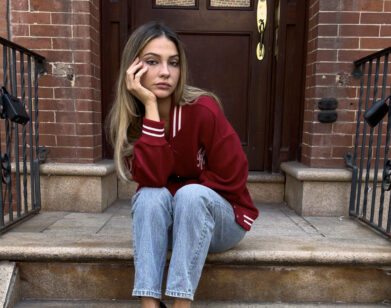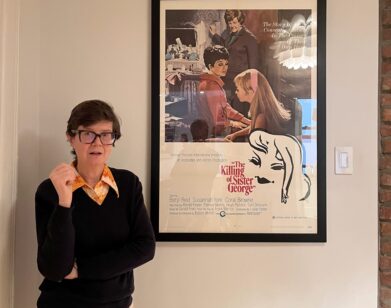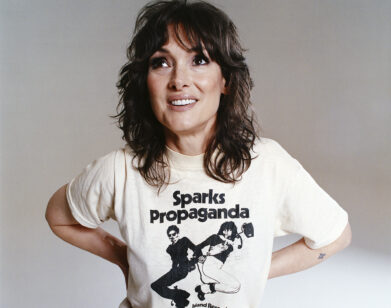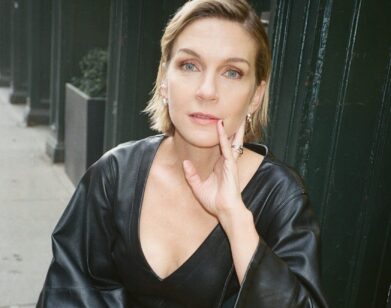Christine Vachon
I’m still looking for stuff that feels that zing of, ‘I haven’t seen this before’ . . . These days, when it’s so hard, it just feels like the thing you have to be is original. Christine Vachon
Perhaps it is unsurprising that when we think about film, we celebrate what is seen: the performers who animate them and even the auteurs who bring them about. But what of the complex machine of production behind the scrim of celluloid? The money-finders, the ego-strokers, and the hard-nosed decision-makers working tirelessly to make it all happen? If you could chart a graph of the most inspired independent films that emerged out of the ’90s and ’00s—from any one of the breakout directors of the time, be it Todd Solondz, Kimberly Peirce, Mary Harron, or Todd Haynes—you would find that a good number of them point to one woman: Christine Vachon. In fact, if we can pin the indie film boom of the ’90s on someone, Vachon’s claim would be as good as any-even if we are all a little vague on what precisely a producer does. As Vachon herself wrote in her first book, 1998’s Shooting to Kill, “When I’m asked what producers do, I say, ‘What don’t they do?’â??”
After graduating from Brown University in the ’80s and moving back to her native New York, Vachon took a job proofreading at a magazine called Cableview. There she re-encountered Haynes, a classmate at Brown, whose seminal 1987 short, Superstar: The Karen Carpenter Story, inspired a long-term working relationship that has continued right up through last year’s Carol, Haynes’s much-buzzed-about Patricia Highsmith adaptation starring Cate Blanchett and Rooney Mara. In 1995 Vachon cofounded Killer Films with Pamela Koffler, and in the decades to follow, their production company’s success grew in tandem with the American independent film movement and with the rise of the Sundance Film Festival (where, coincidentally, Haynes’s first feature, the Vachon-produced Poison, won the Grand Jury Prize in 1991). And beyond Killer’s major works of the ’90s and aughts (including Peirce’s Boys Don’t Cry (1999), Harron’s I Shot Andy Warhol (1996), John Cameron Mitchell’s Hedwig and the Angry Inch (2001), Vachon, now 54, has also worked tirelessly to foster independent filmmakers, producing or executive producing standouts of recent years such as Dustin Lance Black’s Virginia (2012), John Krokidas‘s Kill Your Darlings (2013), Sebastián Silva‘s Nasty Baby (2015), and Richard Glatzer and Wash Westmoreland’s Still Alice (2014), and will this year present Solondz’s Wiener-Dog, Andrew Neel’s Goat, and Elizabeth Wood‘s White Girl.
In December, Julianne Moore (a best actress Oscar winner for Still Alice) called up her friend and longtime colleague to discuss Vachon’s instinct for material, her early cinematic influences, and how, more often than not, Vachon is off in a corner “dealing with it”—whatever it may be.
JULIANNE MOORE: How was Cuba?
CHRISTINE VACHON: It was pretty awesome. I haven’t been there for 16 years. The Sundance Institute brought me, and we showed Carol last night.
MOORE: Did they like it?
VACHON: I think so, but in typical Cuban fashion, even though we had a DCP that had Spanish subtitles, they ended up showing it in English with English subtitles. It was like closed-captions: “subway rumbling,” “street noise.” But they all came up to me afterwards and said they loved it, so I guess it worked.
MOORE: I read an article that said you used to go to the movies with your friends, just to kill time. Is that how you first became interested in movies?
VACHON: I grew up on the Upper West Side, and there were a lot of repertory cinemas, like the Thalia and the Regency. And the Olympia, which was not a repertory theater—the Olympia was one of those “feet stick to the floors” theaters. We would go to see whatever was around, and sometimes we’d wander into movies that we shouldn’t have been in. I have a very vivid memory of wandering around Times Square when I was 12 years old with my best friend, because we would go to Playland [arcade], even though it was completely disgusting and dangerous. We decided we wanted to go see a horror film, and Ingmar Bergman’s Cries and Whispers [1972] was playing on 42nd Street.
MOORE: And that sounded pretty scary.
VACHON: It did! It was a horror film, but not the way we thought.
MOORE: [laughs] You know what’s so funny, I had that same experience when I was in the fifth or sixth grade and lived in Juneau, Alaska. There was this one movie theater with a really interesting and clearly very enterprising owner, and he booked a different movie every week, and I saw whatever was there. I saw Minnie and Moskowitz [1971] and One Day in the Life of Ivan Denisovich [1971]. Can you imagine? The Solzhenitsyn thing? I didn’t know what the hell I was watching. But I would see that, and I would also see The Aristocats [1970] and stuff.
VACHON: What’s great also about that time, though, was it was just like television. There would be a movie on every afternoon, and you never knew what it was going to be.
MOORE: You just watched it.
VACHON: Somehow, even if you were hell-bent on only seeing terrible films, they kept slipping one past you.
MOORE: [laughs] But you didn’t know yet that you wanted to be involved in movies as a producer, right?
VACHON: Absolutely not. I went to a liberal arts college. I think there wasn’t the same pressure. I know you have a kid about to head off to college, and I have one who’s a year away from that. It’s so much about, “What do you want to do?” I didn’t feel that at all. I wasn’t so, “I have to have decided what my path is.” I came to New York, and it was a really cool time. People like Jim Jarmusch and Spike Lee were making their first movies, and they were making movies that were personal narratives. Also, this is something I forget: It was music video time.
MOORE: Oh, God, right.
VACHON: There was all this production of these two- to three-minute films with concepts.
MOORE: Did you start producing right out of college? Oh, [Moore’s husband] Bart [Freundlich] and his friend Billy say, “Bye, Christine.” [Vachon laughs] They’re going to the Knicks game.
VACHON: I haven’t seen Bart in a while.
MOORE: He misses you. So you got out of Brown. How did you start producing?
VACHON: My first job, honestly, was as a proofreader. I say that a little disparagingly, but it actually was this sort of incredible thing, where I got this job proofreading for a cable television magazine. Literally, we were proofreading what time movies were on in various time zones.
MOORE: Scintillating.
VACHON: Exactly. But I got all my friends a job there, too. Todd [Haynes] worked there, I worked there. It became this thing, like, if you knew Christine, she could hook you up for this job. That was the kind of job that artists had. You could make your own hours and the pay was decent. I think it was $8 or $10 an hour. Remember, this is the ’80s.
MOORE: I actually do remember. There were a bunch of people I knew, actors, who used to proofread at night.
VACHON: It was great. For a year or so, we were proofreading, doing as little work as possible and having amazing conversations. We all knew we were doing it so we could do what we really wanted to do. That was how Todd and I re-met after college. We were at college together, but we weren’t friends.
MOORE: Oh, I didn’t know that!
VACHON: He had kind of a hippie vibe. He had a kind of California thing.
MOORE: Were you very punky?
VACHON: Yes.
MOORE: Love it.
VACHON: Then we re-met each other at this cable television magazine, which really, you can’t imagine anything more boring to proofread. It really was deadly, but we had a blast. Then we started a company together to make short films with someone else that we went to Brown with. If that sounds like, “Why on earth would you do that?” it was a different time. There was a lot of grant money available. That’s really all gone now. It felt like it was a way to insert ourselves into what we felt was a really interesting, burgeoning independent-film movement, in a very specific way. And then Todd made Superstar. I worked with Todd and get credited for producing the film, and I happily accept the credit, but it isn’t true. Actually, I usually correct people.
MOORE: You’re pretty gracious.
VACHON: But when I saw the movie, I really did have an epiphany. I’d been working as a production assistant. At that time, in the ’80s, the movies that shot in New York were kind of a mixed bag. It was like, New Line horror films, the occasional German art film that was super-subsidized, and a few TV shows, but nothing much. So I was starting to circle around, what did I want to do in film? Then when I saw Superstar, I really had this epiphany that that was it—that’s the kind of movie I wanted to make, because it was so smart and so original and so innovative but also so entertaining. At that time, there was a divide with movies. There were Hollywood movies and then there were those aggressively anti-narrative films that they showed at the Collective for Living Cinema.
MOORE: [laughs] Right!
VACHON: I’d go see those, and I was like, “This is not for me.”
MOORE: The ’80s were rough. I couldn’t get arrested in film in the ’80s. I’d auditioned for stuff; it was all super, super commercial, and I just couldn’t get the job. There just wasn’t much around.
VACHON: Now, when I think back on Safe [1995], for example, what a radical idea that was, to make a sort-of-commercial, sort-of-not movie that neither side could sort of embrace. And neither side did when it came out.
MOORE: I remember being in San Francisco, and my manager called me to tell me how it went. She was like, “I don’t know how to tell you this, honey, but people were walking out.” [laughs]
VACHON: That was a tough one, but now I think it really opened the door to cinema that was so personal and original, but needed production.
MOORE: Yes. It definitely needed production. I mean, my God, looking back on it, I can’t believe how bare bones it was, and yet how much we had managed to accomplish. So let me get specific about Safe, then. Did Todd just come to you and say, “Hey, I have this thing now …”
VACHON: So, after Superstar, I said, “I want to produce your next film,” and Todd said, “Well, I’m thinking of making this movie that’s three 20-minute segments. It’ll be about an hour long.” I was like, “We’re not doing that. It’s going to be a feature. They can all be 10 minutes longer.” Todd is such an extraordinary artist, and I do feel like I’ve just been so lucky to go along for the ride. There are just a few pivotal points where I feel like I went in there and said, “No, this is what we’re doing,” and did have a real effect. That was one of them. We made Poison [1991], and we took it to Sundance, it won the Grand Jury Prize. I was like, “How hard can this be?” [Moore laughs] I never won it again, by the way. I’ve brought 30 movies to Sundance. That was it. Then we did Dottie Gets Spanked [1993], which is, I think, a wonderful short, but it also introduced Todd to a slightly bigger scale of production. There were some period elements in Poison, but not like Dottie, which was a consistent early ’60s. Then he said he wanted his next film to be about a woman who had environmental illness. He explained it to me as this metaphor for the HIV crisis, which I thought was brilliant because it could never be dated to that. But, of course, we got a lot of flack for that. Then we had to try to figure out how to finance it. Todd often cited one of his biggest influences, Jeanne Dielman [Jeanne Dielman, 23 quai du Commerce, 1080 Bruxelles, 1975] by Chantal Akerman. If you say that to an executive who’s actually seen the film, which is pretty much no executive—it’s a three-hour movie where almost nothing happens. So if they had seen the film, they were like, “Okay …”
MOORE: “I don’t think so.”
VACHON: Otherwise, they were like, “What female filmmaker with a foreign name?” It was very tough to get financed, but we did. Getting that film made was one of the most gratifying things that ever happened to me.
MOORE: It was a seminal moment in my career. It was really the beginning. I remember picking up the script and thinking, “I’ve never seen anything like this.” I couldn’t believe that it was up for grabs, that I could go in and audition for it. It just seemed so unusual and specific.
VACHON: Even though we almost killed you.
MOORE: [laughs] How do you know when you want to be involved in something? Is it just looking for material? I know you have Killer [Films] and you and Pam [Koffler] obviously have lots of relationships, but what is it about a script or project? Is it always director-driven, or is it sometimes just from the script? How do you choose?
VACHON: I guess it has to start from the script to some degree, but we are very director-driven. We work with a lot of writer-directors, but not exclusively. Carol came to us as a script. Todd did a lot. He worked with Phyllis [Nagy] on the script, and he always has to make a script his own. I think most directors have to, whether they’re writer-directors or not. It definitely starts from the script, and now that we’re in this position where there’s a lot of movies that we can help that are under $3 or $4 million, I feel I can bring a very specific kind of thing to them. I can help them find the cast, or I can help assure the cast that there’s an adult in the room; that it’s not going to be a disaster. I’m still looking for stuff that feels that zing of, “I haven’t seen this before.” So much stuff feels old hat or that filmmakers want to do something that feels like something else. These days, when it’s so hard, it just feels like the thing you have to be is original.
MOORE: I think you have managed that your entire career. That’s one of the things that makes it so impressive about the work you’ve been involved in and the things that you’ve produced. Everything has been incredibly original. You’ve never moved mainstream, actually. Not that your work is not accessible; it can be intellectually stimulating, but it can also be entertaining. I think that’s what Killer does. It’s interesting that you’ve found your style and you’ve stuck with it. You haven’t deviated from that.
VACHON: I always say, what really makes a movie commercial is that it makes its money back. So then you have to look at what’s the right budget to make a movie, to make that particular film for. We make plenty of commercial films that make back their budgets but don’t make, necessarily, a gazillion dollars. We’re always weighing what’s the best road to get this film made to keep it as close to the director’s vision as possible? How little do we have to make it for, and can we still make a credible version of that film? Still Alice is a good example of that. But it is this kind of alchemy in independent film. The financing is cast-driven, so how do I find the actor who makes sense, who will have a stake in this, who wants to do it for whatever reason, either because this is a director they want to work with … That’s the easy part, though. I mean, when I have an independent film that Todd Haynes is directing, usually the agent’s like, “They’ll do it.” I’m like, “I didn’t even tell you what it was yet.” “They’ll do it.” So that’s easy. But when it’s a first-time director or a not-so-known director, then I have to sell and be like, “Let me explain to you why this is worth your client’s trouble.” You know? These tiny little movies, I always say they’re just degrees of shitty.
MOORE: [laughs] But that’s not true! You guys have a pedigree at this point. You don’t just say, “This is a Todd Haynes movie,” or whatever; you can say, “This is a Killer film.”
VACHON: Right, but I think that when you’re doing an under-four-million-dollar movie, you just can’t throw money at the problems. If you really have it together, you’ll be okay 70 to 80 percent of the time, and then there will just be that 20 to 30 percent of the time where it’s like, you’re just screwed, and everyone has to roll with it.
MOORE: You want to know something funny? Todd and I had lunch the other day. We were talking about you, and I said, “The thing about Christine, as great as she is and how she can handle absolutely everything”—you’re such a great producer—”but when the news is really bad, when somebody has to give you really bad news, you’re like, ‘Where’d Christine go?'” [both laugh] Because that’s when you know it’s really bad—when we can’t find you.
VACHON: Because I’m usually off in the corner dealing with it.
JULIANNE MOORE IS AN ACADEMY AWARD-WINNING ACTRESS WHO WILL NEXT BE SEEN IN THE FILM MAGGIE’S PLAN, OUT THIS SPRING.

